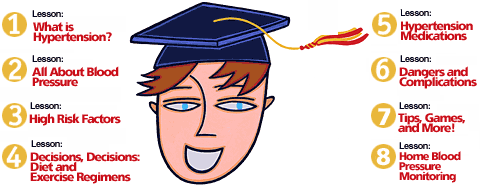



 |
|
|

|
|
Hypertension Lesson 5 - Hypertension Medications 
Back to Hypertension Channel
There is no one treatment for hypertension patients — treatments will vary with your stage of hypertension, your age and overall health. As we've mentioned time and time again, lifestyle changes can help prevent, and in most cases, lower high blood pressure. However, it's important to know that once hypertension has developed, the lifestyle changes we've been discussing throughout the course combine to lower your blood pressure on average by about five or ten points. This may not sound like much at first, but you must remember, any point you can knock off that hypertension scale is certainly worthwhile! However, In some cases of hypertension, diet and exercise alone aren't going to be enough to keep it under control. If your blood pressure needs to be lowered more substantially, your doctor will almost certainly prescribe medication. Taking medication doesn't mean you get to start eating french fries like they're going out of style while spending five hours a day in front of the boob-tube. You MUST continue with your heart-healthy lifestyle if you want your medications to work correctly, and you want to keep your quality of life rating at a maximum. There are dozens of hypertension medications out there today. Below is a brief synopsis of the different drug treatment categories. It’s important to know your options, though in the end, your doctor is best fit to decide which one is right for you. Alright…here we go: Diuretics
Page 1 2 3 4 Copyright © 2000-2026 savvyHEALTH.com. All rights reserved.
|
|
|
|||||||||||||||||
|
About savvyHEALTH | Privacy | Feedback | Home
http://www.savvyHEALTH.com/
All contents copyright © 1999-2026 savvyHEALTH, Inc. All rights reserved.
This internet site provides information of a general nature and is
designed for educational purposes only. If you have any concerns about
your own health, you should always consult
with a physician or other healthcare professional. Please review the Terms of Use before using this site. Your use of the site indicates your agreement to be bound by the Terms of Use.
|
|